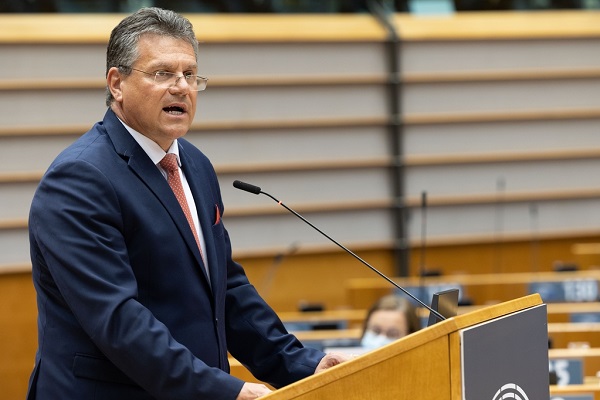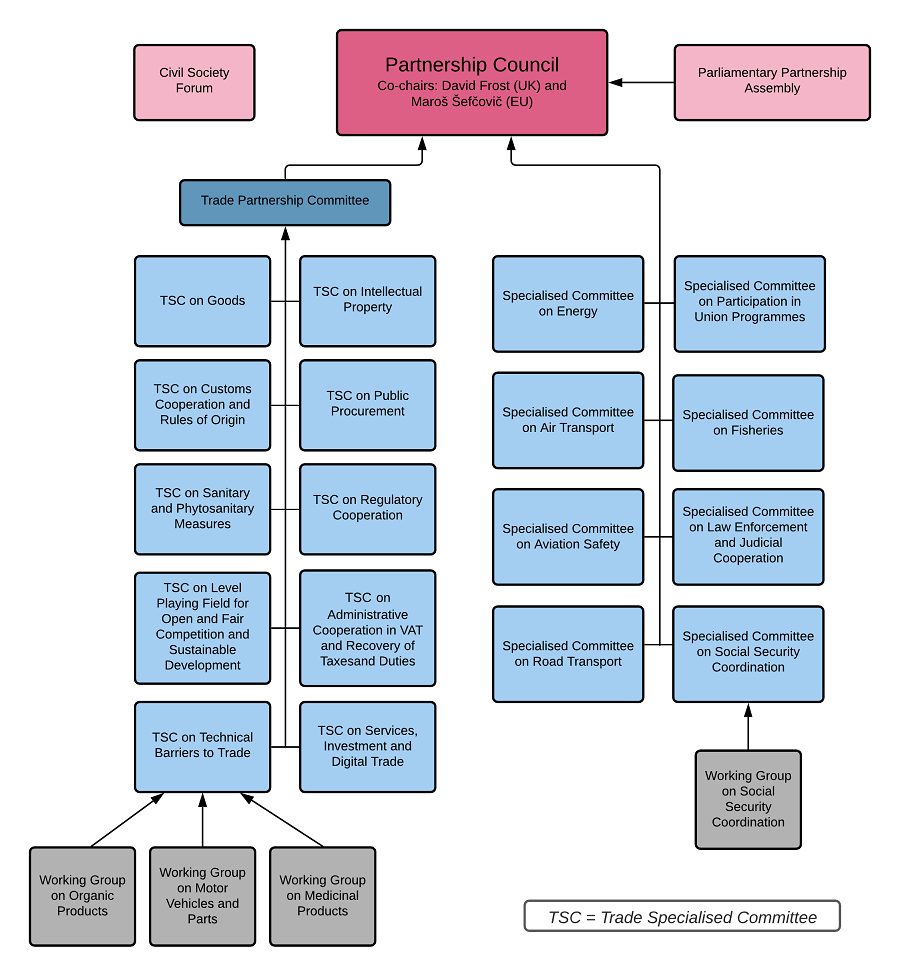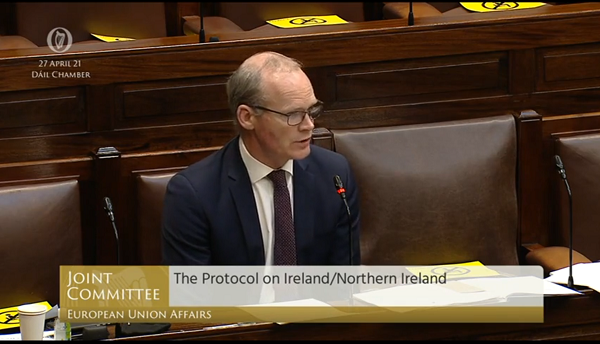Brexit Brief Newsletter
4 May 2021

Welcome to the 4 May 2021 newsletter
The European Parliament has ratified the EU-UK Trade and Cooperation Agreement. Discussions between the EU and UK in relation to the implementation of the Protocol on Ireland/Northern Ireland continue. The Executive Office Committee has been updated by junior Ministers on ongoing work relating to EU Exit. The first public session of the new Sub-committee on the Protocol in the House of Lords has taken place.
European Parliament ratifies deal
European Parliament on Tuesday 27th April voted to ratify the EU-UK Trade and Cooperation Agreement. 660 MEPs voted in favour of the deal which was agreed last year, 5 against, and 32 abstained.
Many MEPs expressed regret that the agreement does not extend to security and foreign policy cooperation, and that the UK will not partake in the Erasmus+ scheme. In relation to recent unilateral action by the UK Government to extend grace periods, MEPs called on the UK “to act in good faith and fully implement the terms of the agreements which it has signed”, including the Protocol on Ireland and Northern Ireland.
Andreas Schieder, rapporteur for the Committee on Foreign Affairs, said that “only a partnership in which both sides stick to their commitments has a future.” Christophe Hansen, rapporteur for the Committee on International Trade, said that ratification of the agreement was “an EU insurance policy against further unilateral deviations from what was jointly agreed”. He said the Parliamentary Partnership Assembly should be convened “to continue building bridges across the Channel."

David Frost, UK Minister with responsibility for European and Brexit, welcomes the ratification | Source: Twitter
Vice-President Maroš Šefčovič released a statement following the ratification of the agreement, saying he would reach out to Lord Frost to prepare the launch of the EU-UK Partnership Council which oversees the Trade and Cooperation Agreement. Šefčovič said that “Democratic scrutiny will continue to be key in the implementation phase of the Agreement in order to ensure faithful compliance." The Commission reiterated that it “will continue to work tirelessly for joint solutions so that the Withdrawal Agreement, and the Protocol on Ireland/Northern Ireland in particular, is also fully implemented and works for the benefit of everyone in Northern Ireland.”

Šefčovič addressing the European Parliament | Source: European Union
Ongoing discussions on the implementation of the Protocol
In her speech to the Parliament, President of the European Commission Ursula von der Leyen said that she was “glad to report some progress” on the ongoing discussions and that recently “we have seen a new, constructive dynamic and we will continue to work closely with the UK to find constructive solutions that respect what was agreed.” She went on to say that “solutions, not soundbites” are needed “if we are to make the Protocol work for the benefit of everyone in Northern Ireland.”
Junior Ministers brief Committee on Brexit matters
On Wednesday, the Committee for the Executive Office heard evidence from junior Ministers in the Executive Office Gordon Lyons (DUP) and Declan Kearney (Sinn Féin). Kearney outlined the issues around supply of medicines to NI, which he said the Executive is considering seriously. The Executive is developing an IT system to monitor the legislation relating to the Protocol.
Chair of the Committee Colin McGrath asked about progress on Common Frameworks and scrutiny by the Committees. Lyons told MLAs that 20 frameworks have been approved, and await JMC(EN) approval; there are four frameworks outstanding. Kearney said the UK Government’s handling of the process has caused “quite a degree of grievance” on the part of the Welsh and Scottish administrations. Kearney confirmed that deputy First Minister has signed off on the frameworks. Lyons was asked to inform the Committee about the delay and said he would take the issue back to the Executive Office.
Lyons said the second meeting of the Joint Consultative Working Group(JCWG) took place on 15 April and the Executive was represented at official level. The JCWG is the body where the UK and EU will exchange information on EU law applicable to Northern Ireland under the Protocol. The meeting covered operational matters relating to the exchange of information between the EU and UK. The next meeting is expected to take place in mid-May.
Regarding the Partnership Council which oversees the Trade and Cooperation Agreement, Kearney said that consistent representations have been made on the matter of participation [of NI] in the Partnership Council, as well as in the bodies which sit under this. On this matter, the European Union has given each member state the right to send one representative as part of the EU delegation to meetings of the Partnership Council and other bodies. (Council decision 2020/2252, Article 2)

Governance structure of the Trade and Cooperation Agreement
On matters relating to checks and controls at NI ports, Lyons said his understanding was that Executive agreement would be needed on this as the issues are considered cross-cutting, significant and controversial. This refers to the role of the Executive Committee as outlined in the Ministerial code which states the criteria under which matters should be brought to the attention of the Executive.
The matter of Executive ministers’ attendance at North-South Ministerial Councils was raised. Minister for Agriculture, Environment and Rural Affairs Edwin Poots declined to attend the planned NSMC agriculture meeting on Wednesday morning. Meetings can only take place if both a unionist and nationalist representative are in attendance. Junior Ministers were asked if increased North-South engagement was needed in the current circumstances. Lyons said it could not be “business as normal” and they have said they [the DUP] are not going to take part in discussions on Brexit on a North-South basis. He said the problems currently exist in the East-West relationship which has been “disrupted”. He said he believes that there should be recognition from the EU and Ireland of the problems the Protocol has caused and how that has affected relationships.
First public meeting of new sub-Committee on the Protocol
The Protocol on Ireland/Northern Ireland Sub-Committee held its first public meeting on 28 April. The new Committee in the House of Lords was appointed by the European Affairs Committee to consider matters relating to the Protocol. Its membership can be viewed here. Jess Sargeant, Senior Researcher at the Institute for Government, and Professor Duncan Morrow, Lecturer in Politics, Ulster University gave evidence for its introductory inquiry into the operation of the Protocol.
Sargeant said it was too early to tell whether the benefits of EU and UK market access for Northern Ireland under the Protocol are attracting inward investment. She said there is potential but that “there also needs to be an active effort to ensure those benefits are realised.” Morrow contended that the ability of UK and Irish Governments to work together is important for the stability of NI and pointed out that the European Commission needs to develop the capacity to manage and work in the Northern Ireland context. He said unilateralism and uncertainty are “probably the single biggest risks” that Northern Ireland faces.
Sargeant said Northern Ireland is in a unique position as it is “subject to law it has no opportunity to influence directly, at least through formal institutions”. She said the Joint Consultative Working Groups should be “not just a forum for the exchange of information but a genuine forum for consultation.” She said NI interests could be represented by Ireland where they intersect with north-south cooperation, and that the UK Government and NI Executive have possibilities to influence EU law through informal channels. Morrow concurred that “there is the potential for Northern Ireland to act independently and for pressure to be put on the European Union in relation to the ways in which Northern Ireland can at least influence and have direct input into issues that are of specific relevance to Northern Ireland”. Sargeant also pointed out that the Committee could amplify voices from Northern Ireland in Westminster and Whitehall. She said that “the Brexit process has shown that there is sometimes a lack of understanding in both those institutions about Northern Ireland”.
Simon Coveney on the Protocol’s implementation
Irish Minister for Foreign Affairs Simon Coveney gave evidence to the Oireachtas Joint Committee on EU Affairs on the Protocol on Ireland/Northern Ireland on 27 April.
Coveney told the Committee that discussions between the UK and EU on the Protocol relate to around 26 issues, about 20 of which can be “resolved through technical negotiation”, a further six which are “much more political and more difficult to deal with”. He said these issues may “involve negotiation and changes in approach that can allow the protocol to be implemented more easily.” The issues include SPS arrangements, steel, tariffs, country of origin rules, and supplies of medicines.
On relations between the UK and EU, Coveney said that, “relationships are improving but there are still real issues with regard to trust... There is still a lot of soreness around the story of Brexit, its negotiation and the relationship between the two sides but I hope that will heal over time.” Coveney said that from the perspective of European Commission Vice-President Šefčovič, he needs to “ensure the EU is seeing follow-through on the commitments to which the UK has signed up, which to me seems a perfectly reasonable ask”. He added that, “certainly there are also political pressures on Lord Frost and expectations around this.”

Minister for Foreign Affairs Simon Coveney giving evidence to the Oireachtas Committee | Source: Oireachtas
Coveney stated that they hope that a meeting of the British-Irish Intergovernmental Conference will take place “at some point in the coming weeks and months”. He said “there are many issues that Dublin and London need to be talking to each other about in the context of Northern Ireland and the relationship between these islands.”
Coveney was also asked about the dairy processing industry – he pointed out some dairy processors in Ireland source up to 40% of their milk from Northern Ireland. This can be sold throughout the EU but issues arise in relation to EU trade deals and country of origin labelling. He said the ideal scenario would see an agreement in the EU that NI product can be considered within the trade agreements as EU product. This, however, would require an amendment to trade deals and then the other party to the agreement is likely to ask for a corresponding change. Coveney said there is no appetite in the EU to start such a process but that “I have certainly been advocating for that to ensure goods produced in Northern Ireland are at no disadvantage to goods produced in any other part of the Single Market or even the island of Ireland in the context of EU trade agreements.”
Farming community gives evidence on new trading arrangements
The Northern Ireland Affairs Committee on Wednesday heard from representatives from the farming community in the UK. Daryl McLaughlin of the Ulster Farmers’ Union, Neil Shand of the Nation Beef Association, Phil Stocker of the National Sheep Association, and John Martin of Holstein NI spoke to the Committee.
Shand told the Committee that Northern Irish breeders “were promised unfettered access to the GB market, and that’s clearly not the case.” Shand wrote to Secretary of State for Environment, Food and Rural Affairs and the Northern Ireland Minister for Agriculture, Environment and Rural Affairs on 31 March 2021, on behalf of the UK Task and Finish Group on UK Livestock Movements. He outlined issues relating to show licences, sheep scrapie monitoring and re-tagging of animals exported from GB to NI. He suggested an industry group be created with the EU Commission, “to look at the EHC (Export Health Certificate) to find a way to make it workable and user friendly for all concerned.” McLaughlin confirmed that if a NI producer takes a pedigree bull to the UK which does not sell, the NI farmer must find a farmer in GB to hold the animal for 6 months. He stated that there is a significant cost involved with this.
Stephen Farry MP (Alliance) asked about how far an EU-UK veterinary agreement would alleviate the issues. The Committee heard that current legislation “does not fit” and that standards have not changed since the start of the year. McLaughlin said the government should be taking the idea of a New Zealand or Swiss-style deal seriously, but that this is a long-term solution. Stocker said their experience over recent months is that they have struggled to get engagement on this and that any agreement on the matter would take a long time to come about. Stocker said it was a “fairly safe assumption” that there would also be large reduction in costs with an agreement which reduced checks and controls by 80-85%.
Other news
- The Specialised Committee on Citizens’ Rights met on 28 April 2021. The Committee was established under the Withdrawal Agreement to monitor the part of the agreement which protects the rights of UK citizens in the EU, and EU citizens in the UK. In a joint statement, the European Commission and UK Government “reaffirmed their commitment to address issues where both Parties do not share the same interpretation”. The parties agreed to meet again in June to produce a fourth Joint Report on Residence and to “maintain a close dialogue on implementation and application”.
- Lord Frost and Secretary of State for Northern Ireland Brandon Lewis met with civic society in Northern Ireland last week to discuss the Protocol and other matters. The EU and UK in their most recent statement agreed to continue engagement with businesses, civil society and other stakeholders in Northern Ireland.
This Week at the Assembly
- Tuesday 4 May, 2pm – Plenary - Question Time - The Executive Office; Agriculture, Environment and Rural Affairs
- Wednesday 5 May, 10am - Committee for Infrastructure - Briefing from the Northern Ireland Local Government Association & SOLACE NI - EU Successor Funding
- Thursday 6 May, 2pm – Committee for Agriculture, Environment and Rural Affairs -Withdrawal of DAERA and Local Authority Staff from Ports - Oral Evidence from PSNI, and Mid and East Antrim Borough Council; Written briefing from DAERA on EU Exit legislation
Catch up with the Committees
- Wednesday 28 April, 2pm – Committee for The Executive Office - UK Exit from EU - Oral evidence session with junior Ministers on Brexit Issues
- Thursday 29 April, 10am - Committee for Agriculture, Environment and Rural Affairs - Withdrawal of DAERA and Local Authority Staff from Ports - Belfast City Council & Newry, Mourne, and Down District Council; Written Briefing from DAERA - EU Transition Update
- Thursday 29 April, 2.30pm – Ad Hoc Committee on a Bill of Rights - Briefing by NIHRC and the Equality Commission: Implications of Brexit for Human Rights



